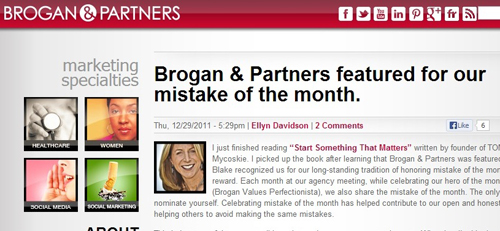Podcast: Play in new window | Download
I was speaking to a delegation of manufacturers from China about old and new leadership approaches in America. After every four or five sentences, I would stop. The interpreter would then reel off sentences in Mandarin. I’d catch when he said a word, like “Google” or “Obama,” but otherwise I understood absolutely nothing. As he spoke, I strained to read the non-verbal feedback they showed for the ideas the interpreter was relaying to them.
I described one of the best assets of great American businesses, our honesty and openness. And I shared this story of how my friends at the advertising firm Brogan & Partners approach mistakes:

Every month they not only explain their heroes and triumphs, but also their mistakes. I explained how so much learning flows from an honest assessment and exploration of what’s gone wrong. As far as I could read the feedback of my Chinese audience, I thought that they pretty much “got” what I was saying.
So I asked them , “In your culture, can you imagine celebrating the mistake of the month?” The feedback was quicker and more visible than any I had received in the first two hours of my presentation: Heads (including those of the two top guys) nodded an emphatic NO!!! Although I expected that would be their answer, I guess I was surprised at how quick and emphatic it came back to me. So instinctively, I asked, “Can you imagine the value of a practice that would explore mistakes?” And as the interpreter expressed my question in Mandarin, their heads now nodded “yes” almost as quickly and emphatically as they had said “no” to the possibility of actually welcoming a discussion of failure. They totally “got” the value. They just could never see seizing it.
I took it as a cultural commentary on a still-closed Chinese society. In a culture that values “face,” e.g., saving face, it would not be kosher to talk openly about making mistakes. I suspect we have a great competitive advantage in our innate openness. But I also saw their “nods” as reflective of a universal human fear. None of us want to share our mistakes. But don’t we learn more from miscues than from watching our P’s and Q’s?
I’m certain that cultures open to learning from mistakes allow us to
Lead with our best selves!
Dan
